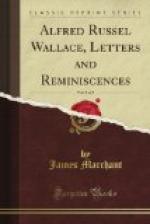This fascinating treatise upon the position occupied by the earth, and man, in the universe, had the same effect as some of his former writings, of drawing forth unstinted commendation from many religious and secular papers; whilst the severely scientific and materialistic reviewers doubted how far his imagination had superseded unbiased reason.
On one point, however, most outsiders were in agreement—that he had invested an ancient subject with freshest interest through approaching it by an entirely new way. The plan followed was that of bringing together all the positive conclusions of the astronomer, the geologist, the physicist, and the biologist, and by weighing these carefully in the balance he arrived at what appeared to him to be the only reasonable conclusion. He therefore set out to solve the problem whether or not the logical inferences to be drawn from the various results of modern science lent support to the view that our earth is the only inhabited planet, not only in our own solar system, but in the whole stellar universe. In the course of his close and careful exposition he takes the reader through the whole trend of modern scientific research, concluding with a summing-up of his deductions in the following six propositions, in the first three of which he sets out the conclusions reached by modern astronomers:
(1) That the stellar universe forms one connected whole; and, though of enormous extent, is yet finite, and its extent determinable.
(2) That the solar system is situated in the plane of the Milky Way, and not far removed from the centre of that plane. The earth is, therefore, nearly in the centre of the stellar universe.
(3) That this universe consists throughout of the same kinds of matter, and is subjected to the same physical and chemical laws.
The conclusions which I claim to have shown to have enormous probabilities in their favour are:
(4) That no other planet in the solar system than our earth is inhabited or habitable.
(5) That the probabilities are almost as great against any other sun possessing inhabited planets.
(6) That the nearly central position of our sun is probably a permanent one, and has been specially favourable, perhaps absolutely essential, to life-development on the earth.
Wallace never maintained that this earth alone in the whole universe is the abode of life. What he maintained was, first, that our solar system appears to be in or near the centre of the visible universe, and, secondly, that all the available evidence supports the idea of the extreme unlikelihood of there being on any star or planet revealed by the telescope any intelligent life either identical with or analogous to man. To suppose that this one particular type of universe extends over all space was, he considered, to have a low idea of the Creator and His power. Such a scheme would mean monotony instead of infinite variety, the keynote of things as they are known to us. There might be a million universes, but all different.




